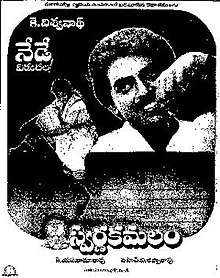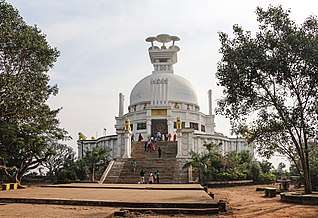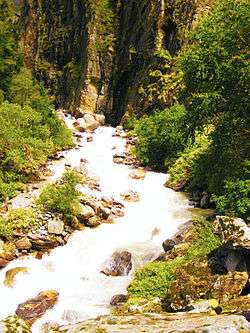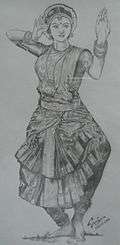Swarnakamalam
Swarnakamalam (transl. The Golden Lotus) is a 1988 Indian Telugu-language language dance film, written and directed by K. Viswanath.[1] The film starred Venkatesh and Bhanupriya in the lead roles while Sharon Lowen reprised herself in a special role.[2] The choreography is helmed by Kelucharan Mohapatra, with a soundtrack by Ilaiyaraaja.[3][1] The song sequences were extensively shot at the Valley of Flowers National Park, the Nanda Devi National Park, the Shanti Stupa and Bhringesvara Siva Temple at Dhauli; other locations in Visakhapatnam.[4]
| Swarnakamalam | |
|---|---|
 Theatrical Release poster | |
| Directed by | K. Viswanath |
| Produced by | C. H. V. Appa Rao K. S. Rama Rao (presenter) |
| Written by | Sainath Thotapalli (dialogue) |
| Screenplay by | K. Viswanath |
| Story by | K. Viswanath |
| Starring | Venkatesh Bhanupriya Sharon Lowen |
| Music by | Ilayaraja |
| Cinematography | Lok Singh |
| Edited by | G. G. Krishna Rao |
Production company | Bhanu Art Creations |
Release date |
|
Running time | 143 minutes |
| Country | India |
| Language | Telugu |
The film was screened at the Indian panorama section of the 12th International Film Festival of India,[5] the Asia Pacific Film Festival and the Ann Arbor Film Festival.[6][7][2] The film received three Indian Express Awards, three state Nandi Awards, and two South Filmfare Awards, including Nandi Award for Best Feature Film and Filmfare Best Film Award (Telugu).[8][9]
Plot



Meenakshi (Bhanupriya) and Savitri (Devilalita) are daughters of a Kuchipudi doyen, Vedantam Seshendra Sharma. While a highly accomplished artist in his field, Seshendra Sharma is not well-off and has not been able to afford for his daughters, a conventional education. Both of them have achieved a respectable degree of proficiency — Savitri in Carnatic classical music and Meenakshi in classical dance.
Savitri, the elder daughter, is grateful for her knowledge and interest and looks forward to a life that will require her to hone her skills in the art. Meenakshi, on the other hand, is bitter about the lack of opportunity that she feels in the field of classical dance in India and resolves to make a simpler and more pleasurable life for herself as soon as possible, while confiding her ambitions only to her sister.
Chandrasekhar (Venkatesh) is a tenant who has just moved in next door. He is a painter and is shown to be handling movie promotions as a large part of his work. He develops an interest in the neighbors and tries to help them in whatever way he can, partly because of his (unconfessed) interest in Meenakshi and partly because of his interest in the art which seems to be slowly fading from public life.
The rest of the film is largely built around Meenakshi's journey from skepticism to devotion in her pursuit of dance. Chandrasekhar is shown to be an important catalyst in this transformation. Meenakshi becomes an accomplished dancer through the direction of renowned Odissi dancer Sharon Lowen, and gets the opportunity to go to the United States and perform. She learns of Chandrasekhar's love for her, and finally unites with Chandrasekhar, confessing her love for him as well.
Cast
- Venkatesh as Chandu / Chandra Shekar
- Bhanupriya as Meenakshi
- Shanmukha Srinivas as Srinivas
- Sakshi Ranga Rao as Omkaram
- Sri Lakshmi as Akhilam
- S. K. Misro as Government official
- Devilalita as Savitri
- Dubbing Janaki
- Pavala Syamala
- Sharon Lowen as herself
- K. V. Satyanarayana
- Vinnakota Vijayaram
- N. Sivarama Krishnaiah
- K. S. T. Sai
- S. S. Vajpayee
Production
The production design was helmed by Arun D. Ghodgaonkar, with cinematography by Lok Singh.[4] Casting was done by K. Viswanath, including American dancer Sharon Lowen, who portrayed herself as a veteran Odissi artist.[2]
Soundtrack
The music for the film was composed by Ilaiyaraaja and released on ECHO Music Company.
| No. | Title | Lyrics | Singer(s) | Length |
|---|---|---|---|---|
| 1. | "Ghallu Ghallu" | Sirivennela Sitaramasastri | P. Susheela, S. P. Balu | 5:02 |
| 2. | "Aakasamulo" | Sirivennela Sitaramasastri | S. Janaki | 4:29 |
| 3. | "Kothaga Rekka" | Sirivennela Sitaramasastri | SP Balu, S. Janaki | 4:29 |
| 4. | "Koluvai Vunnade" | Shahuji I[10] | P. Susheela, S. P. Balu | 4:57 |
| 5. | "Andela Ravamidhi" | Sirivennela Sitaramasastri | S. P. Balu, Vani Jairam | 6:59 |
| 6. | "Shiva Poojaku" | Sirivennela Sitaramasastri | P. Susheela, S. P. Balu | 6:04 |
| 7. | "Cheri Yasodaku" | Annamayya Keerthana | S. P. Sailaja | 4:35 |
| 8. | "Aathmathvam" | Siva Manasa Puja | S. Janaki | 3:07 |
| 9. | "Natarajane" | Sirivennela Sitaramasastri | P. Susheela | 1:19 |
| Total length: | 44:39 | |||
| Swarnakamalam | ||||
|---|---|---|---|---|
| Film score by | ||||
| Released | 1988 | |||
| Genre | Soundtrack | |||
| Length | 44:39 | |||
| Label | Echo Music | |||
| Producer | Ilaiyaraaja | |||
| Ilaiyaraaja chronology | ||||
| ||||
Awards
- Nandi Awards - 1988
- Best Feature Film - (Gold) - Ch.V. Appa Rao
- Best Actress - Bhanupriya
- Special Jury Award - Venkatesh
- Filmfare Awards South - 1988
- Best Film – Telugu - Ch.V. Appa Rao[11]
- Best Actress – Telugu - Bhanupriya
- Cinema Express Awards - 1988
- Cinema Express Awards Best Film - Ch.V. Appa Rao [12]
- Cinema Express Awards Best Director - K. Viswanath[12]
- Cinema Express Awards Best Actress - Bhanupriya[12]
References
- Ranjana Dave (30 June 2011). "The meaning in movement". The Asian Age. Retrieved 4 September 2012.
- Kumar, Ranee. "Sharon Lowen, an envoy of Indian culture".
- http://www.paadal.com/composer/ilayaraja
- http://www.indianbackgroundscore.com/viewtopic.php?f=8&t=164 indianbackgroundscore.com
- "Indian Panorama for 12th IFFI Festival" (PDF).
- "Dance without frontiers: K Viswanath – Director who aims to revive classical arts". 2 May 2017.
- 30 Jun 2011 - Ranjana Dave (30 June 2011). "The meaning in movement". The Asian Age. Retrieved 4 September 2012.
- Subramanium (5 September 2005). "'So many parallels in our life". p. 01 – via The Hindu.
- "Directorate of Film Festival" (PDF).
- Shahaji Maharaja of Tanjore (20 December 1955). "Pallaki Seva Prabandham" (PDF). Saraswati Mahal Library. Retrieved 15 April 2018.
- https://books.google.com/books/about/Vidura.html?id=S5ZZAAAAMAAJ. C. Sarkar., 1989 - Journalism
- Express News Service (11 March 1989), "Cinema Express readers choose Agni Nakshathiram", The Indian Express, p. 4, retrieved 7 October 2016